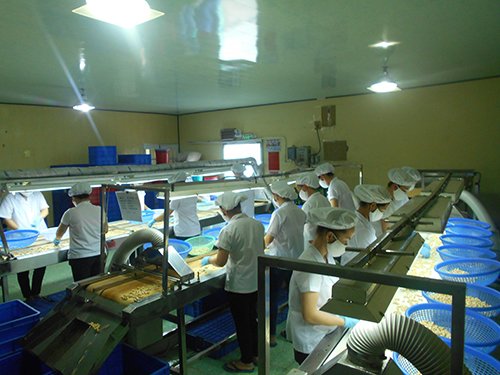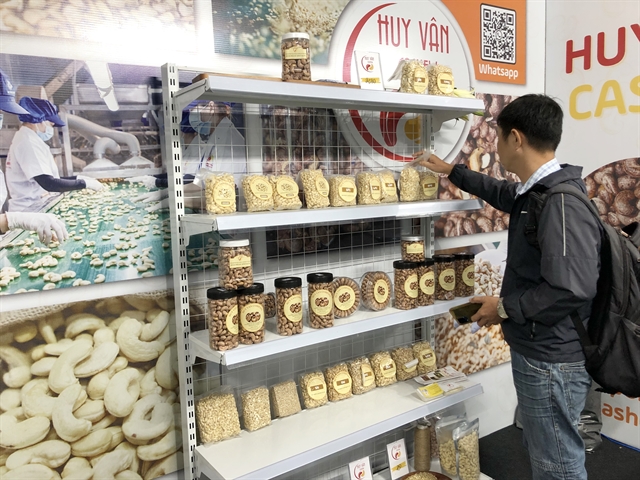 Economy
Economy

 |
| Workers process cashew for export. Cashew processing firms have embraced intensive processing to add value to their exports. — VNS Photo |
HCM CITY — Cashew processing businesses have in recent years invested in modern machinery and equipment for intensive processing and adding more value to their products, according to insiders.
Hoàng Sơn 1 JSC, one of Việt Nam’s leading processors and exporters of the nut, has, for instance, invested a huge amount of money to build a modern plant.
According to its chairman, Tạ Quang Huyên, the plant is equipped with state-of-the-art processing technologies to ensure products meet strict new international standards.
Its highly processed items include roasted and salted cashew with skin, wood fire roasted, wood fire roasted and salted, roasted, and flavoured cashews, and are exported to markets such as Japan, China and the Middle East.
Highly processed items accounted for 30-40 per cent of its export revenue last year, and the company would focus more on deep processing and expanding its portfolio of processed items and increasing their proportion of exports, he said.
“Highly processed products offer high value and thus better profit margins compared to semi-processed products.”
Another leading firm that has succeeded in producing and exporting highly processed cashew products is Long Sơn JSC.
Vũ Thái Sơn, its chairman, said demand for highly processed cashew is on the rise, and countries that have free trade agreements with Việt Nam have waived tariffs on processed cashew.
So his company has stepped up investment in production of highly processed and high-quality cashew and embraced green transformation and social and environmental responsibility to meet the increasingly stringent requirements of buyers, thereby getting better than market prices, he said.
He said last year it was quite successful in exporting to China products such as roasted and salted, chili garlic, spiced, sesame, and honey cashews.
It also sells directly to large supermarket systems such as Walmart and others around the world.
Việt Nam has been accounting for a whopping 80 per cent of global exports for the last 16 years, but they have mainly been of semi-processed items of low value, according to insiders.
Speeding up intensive processing and export of highly processed products would help raise the country’s profile in the international market and open up opportunities for Vietnamese businesses to export under their own brands, they said.
Brighter outlook
After decreasing in both export volume and value terms in 2022, cashew exports recovered in 2023 with 641,000 tonnes of kernels exported for US$3.63 billion, year-on-year increases of 23 per cent and 17 per cent.
 |
| Cashew exports grew significantly in January, creating high hopes for prospects this year. — VNS Photo Xuân Hương |
In January nearly 64,000 tonnes worth $339 million have been exported, up 137 per cent and 125 per cent year-on-year, creating high hopes for prospects this year, according to cashew firms.
Phùng Văn Sâm, president of Hanfimex Group, a producer and exporter of foods and spices, said the global cashew market is expected to grow by an average of 4.6 per cent a year in 2022-27.
“The global trend favouring vegetarian and plant-based diets has driven demand for various nuts and processed nut-based foods, including cashew, and the current low price of cashew nuts will help promote consumption of this healthy product.”
Joseph Lang, managing director of Kenkko (UK), one of Europe's largest buyers, also expressed optimism about the market, saying European consumers have increasing awareness of nuts’ health benefits and prefer the taste of cashew to other nuts.
“Europe is the largest importer of cashew nut kernels in the world, accounting for 35-40 per cent of global cashew import value. In the next five years the European market for cashew nuts is predicted to grow at a rate of 4-6 per cent.”
Chen Ying, secretary general of the China Nut Association, said: “China's imports of tree nuts have been increasing year after year since 2017. With the exception of walnuts, demand basically outstrips supply.”
Of the nuts widely consumed in China, cashew and pistachio are 100 per cent imported, with 70 per cent of cashew coming from Việt Nam, she said.
“The per capita consumption of nuts in China is still far behind that of developed countries, and so the potential is huge.”
But the insiders also warned about challenges like a drop in export prices, the dependence on imported raw cashew and rising shipping costs and time due to the Red Sea tensions.
According to Việt Nam Cashew Association chairman Phạm Văn Công, processed cashew prices have fallen significantly in recent years as against a minor fall raw nut prices.
As a result, most Vietnamese processors and exporters suffer losses or barely break even despite increasing exports, he said.
Both he and Sâm said that with the cashew crop this year forecast to be abundant, businesses should not buy large volumes right at the beginning of the season to stockpile.
They should wait until prices fall to reasonable levels, and only buy when they have an export contract, they added.
“Firms should buy raw materials at the right time and right price,” Sâm said.
They also need to keep good control over costs, step up trade promotions, diversify their product portfolio, and stringently control quality of raw nuts, he added.
Vietnamese exporters realise that countries that for long used to be major suppliers of raw cashew have themselves started processing the nuts for export, making it both difficult to buy raw cashew and increasing competition in the global market.
Việt Nam’s cashew industry needs to focus on improving quality and diversifying products by focusing on deep processing to keep its competitive advantage, they added.
Vũ Thái Sơn of Long Sơn JSC said the cashew industry must also keep abreast of the current green trend to meet consumers’ more stringent requirements in terms of environmental and social responsibility. — VNS